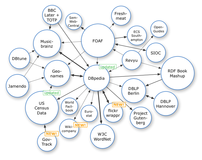 Image via WikipediaWill it all just pass on by?
Image via WikipediaWill it all just pass on by?For someone who has invested so many years in moving forward Semantic Technology it is exciting and disturbing how
 difficult it has been to get people to adopt. I have previously blogged somewhat on this, so I won't go on. But increasingly I fins myself creating the "Semantic Web" without using semantic technology. Today after discussing twitter, twirl and a myriad of other social applications we commented how very semantic they all are, and that the behavior they instill in people to create context around their on and offline activities is creating this new web. With that it can be said that I am a participant - as likely you are as well - in what I thought of as a socio-semantic web. This is however, more of a stating the obvious than a flash of light moment.
difficult it has been to get people to adopt. I have previously blogged somewhat on this, so I won't go on. But increasingly I fins myself creating the "Semantic Web" without using semantic technology. Today after discussing twitter, twirl and a myriad of other social applications we commented how very semantic they all are, and that the behavior they instill in people to create context around their on and offline activities is creating this new web. With that it can be said that I am a participant - as likely you are as well - in what I thought of as a socio-semantic web. This is however, more of a stating the obvious than a flash of light moment.I thought this sociosemantic term cool and like all things I knew I must not of coined it. A quick google later and there are a number of historic references from way back in 2005 :) on this topic. Peter Morville in his book Ambient Findability
has a chapter dedicated to his definition of the concept. The book has now been added to my reading list. I like a bit of history. But what is it that "I" think it is.
We have engaged in blogging, building social profiles, collecting friends, posting images from phones, cameras and the like. Bookmark collection and peer recommendation has proliferated. Now we micro-blog and track "friends", we group tag items of photos, places, wish-lists. All of these items were initially closed or proprietary to the site that created them. As sites have opened up and created API's it has promoted further innovation. Aggregation on the aggregation, niche applications to deal with individual filtering or information processing, a network effect of connections, no longer just the social graph of friends, but now the graph of our online activity and behavior, maybe even preference. It is this unformalized information structure that is creating the socio-semantic web around us. And I don't see a standards body in sight.
While rich with context and ever extending and changing - see the sudden rise of friendfeed as an example - this ssw is lacking in broad interchange, formal understanding and federated discovery. These are the core offerings of semantic technology standards, but does the ssw need them, or will the same collective view that organically created it just inovatedand deliver, on an as needed basis.
I don't know. The only way to find out is to just get on with it. Use it and innovate it. Sparql on Flickr anyone?
